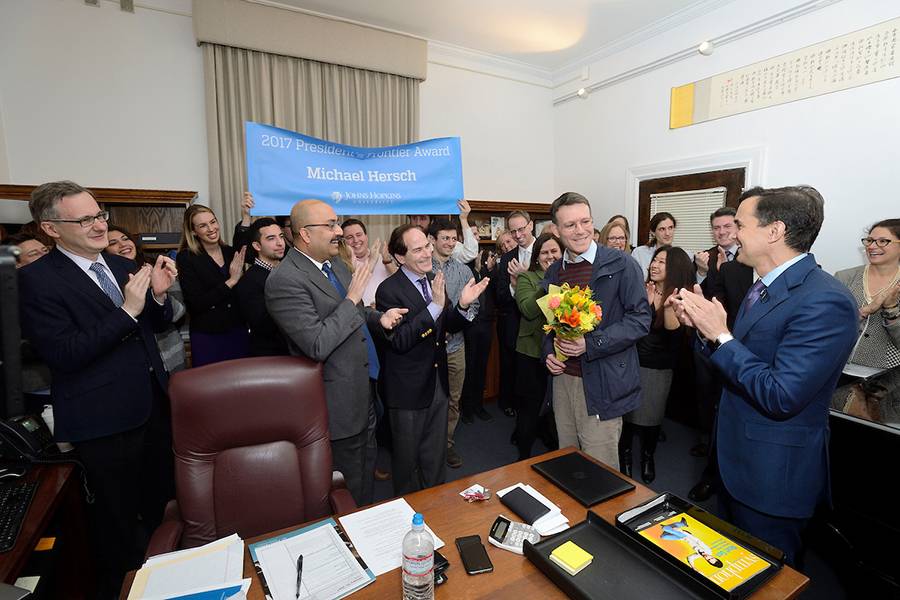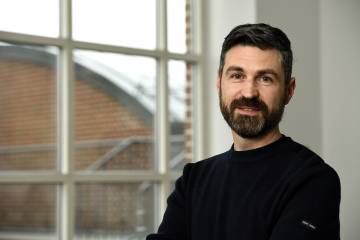Johns Hopkins nephrologist Deidra Crews is attempting to hunt down the origins of chronic kidney disease and better understand how intractable factors like poverty and limited access to food determine who gets the disease and how it progresses.
But she has encountered a particular barrier: Kidney disease research, she says, gets both limited exposure and limited funding, and her specific research specialty is one that often gets missed entirely.
That has started to change over the past year and a half, however. In January 2018, Crews became the fourth recipient of the university's President's Frontier Award, presented in each of the past five years to a faculty scholar who is on the cusp of transforming his or her field.
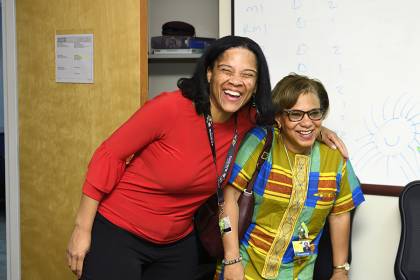
Image caption: Deidra Crews (left) hugs colleague Lisa Cooper after being surprised with the $250,000 President's Frontier Award presentation Monday morning. The award recognizes researchers who are poised to break new ground and be leaders in their field.
Image credit: Will Kirk / Homewood Photography
The award—initially funded for five years and recently renewed for an additional five years with a gift from Louis J. Forster, chair of the university's board of trustees—comes with $250,000 in flexible funding. The money can be used in whatever way the researchers choose in order to push their work forward.
For Crews, the award helped raise awareness of her area of study. Shortly after Crews received the award, The Baltimore Sun published an article about her work, and she won two significant national awards.
"It's really elevated exposure of the conditions I'm working on," she says. "That has helped move the dial on kidney disease, beyond my own professional career."
Crews has used the Frontier funds to devote more time to research, and to travel and foster new collaborations, including with University Hospital Limerick in Ireland. Last January, she organized a forum on food insecurity in partnership with the Johns Hopkins Center for Health Equity.
She's also hired more staff for her lab as she continues work on studies like Five Plus Nuts and Beans for Kidneys and embarks on new projects—including one she's discussing with a Hopkins colleague to explore drone delivery of groceries to residents living in food deserts.
"The Frontier Award allows us to reach beyond federal funding," she says, "and be a bit more creative and exploratory."
Other past recipients of the award are stem cell researcher Sharon Gerecht, molecular biologist Scott Bailey, composer Michael Hersch, and astrophysicist Brice Ménard.
The recent gift of $1.25 million from Forster, an alumnus of the Krieger School of Arts and Sciences (1982) and the School of Advanced International Studies (1983), will support the award program through 2024. Beginning today through Nov. 4, nominations for the 2020 Frontier Award can be submitted online. Nominees should be full-time and preferably midcareer faculty members at Johns Hopkins who have demonstrated exceptional scholarly achievement.
"Over the past five years, the Frontier Award program has supported some of our most promising and extraordinary scholars, giving them the freedom to take bold risks and push the boundaries of innovation in their fields," JHU President Ronald J. Daniels says. "Thanks to Lou Forster's continued commitment, we are thrilled to be able to offer five more pioneering faculty members this remarkable opportunity."
Below is a brief look at how other past recipients have been able to advance their work with the support of the President's Frontier Award.
Sharon Gerecht
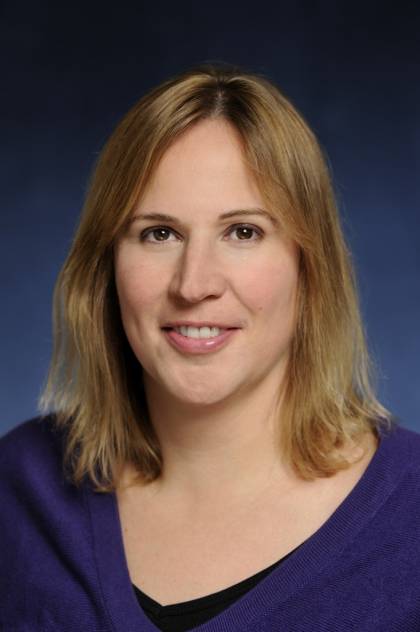
Image caption: Sharon Gerecht
Gerecht, a groundbreaking researcher in vascular stem cell biology, received the first Frontier Award in 2015. Since then, she says, her career has advanced in ways she never expected.
"The internal recognition carries over to the research community outside Hopkins and is a huge boost, especially for a woman in engineering," she says. "It's given me opportunities to take on projects I otherwise wouldn't have."
In 2016, Gerecht was promoted from associate to full professor of chemical and biomolecular engineering in the Whiting School of Engineering, then named director of the Johns Hopkins Institute for NanoBioTechnology the following year.
With the boost from Frontier Award funds, her lab has expanded its research in a number of new directions, including understanding the impact of the tumor microenvironment on metastasis and lymphocytes, and work with extended animal models for stem cell and regenerative engineering studies. Gerecht and her team have also embarked on new collaborations, including with JHU's Wilmer Eye Institute and the Hopkins cardiac surgery team.
Scott Bailey
Bailey, an associate professor in the Bloomberg School of Public Health's Department of Biochemistry and Molecular Biology, says the majority of the funds from his 2016 Frontier Award went toward his lab's largest and most critical expense: hiring and retaining support staff. But more broadly, he says the award provided him "esteem both within and outside Hopkins that opened doors to further funding and collaborations."
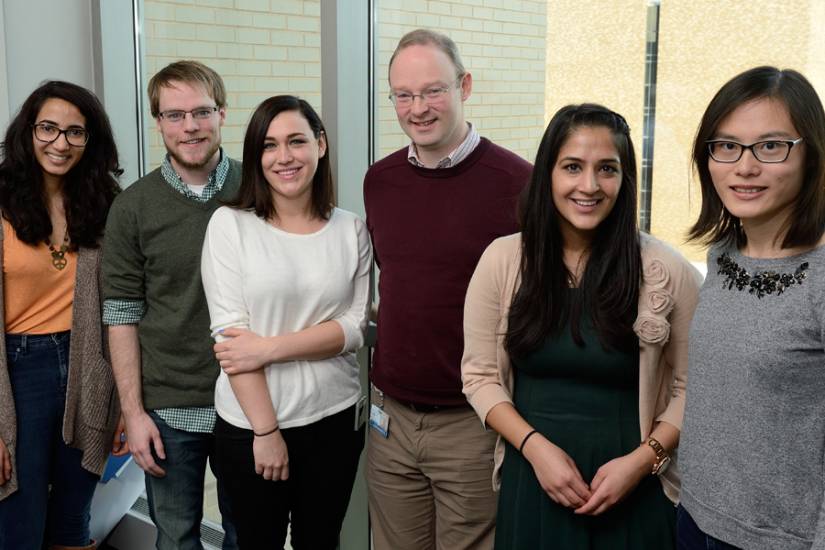
Image caption: Johns Hopkins biologist Scott Bailey, pictured with his research team, received the 2016 Frontier Award
Image credit: WILL KIRK / HOMEWOOD PHOTOGRAPHY
Bailey's lab uses X-ray crystallography to study the molecular processes behind protein nucleic acid interaction. Recently, Bailey says, his team has embraced single molecule techniques to study the gene editing CRISPR system of bacterial immunity. They've done this work in collaboration with another Hopkins expert, Bloomberg Distinguished Professor Taekjip Ha, studying the dynamics of the CRISPR complex as they search for targets. Additionally, the team is using a single particle called "cryoEm" to study the structure of CRISPR complexes.
"All of these studies are aimed at better understanding how the CRISPR complex finds and cleaves DNA, which will hopefully lead to new tools for genome editing and manipulation," says Bailey, who is also affiliated with the Johns Hopkins Malaria Research Institute.
Michael Hersch
As a composer and pianist, Hersch (pictured above) has found that funding of any kind is all too scarce in the contemporary music world. Before winning the Frontier Award in 2017, the Peabody Institute professor says he had "little to no expectation that many of my pieces would ever be presented publicly or on recording, as I had intended."
With the Frontier Award, however, Hersch has been able to complete his largest work to date: an instrumental trilogy 15 years in the making, sew me into a shroud of leaves, which premieres in Vienna in November. Other recent works have included the monodrama On the Threshold of Winter and the multimedia string quartet performance Images from a Closed Ward.
Hersch also recently completed two commissioned recordings, Violin Concerto with Patricia Kopatchinskaja and the International Contemporary Ensemble, and end stages with Orpheus Chamber Orchestra. Now composer-in-residence at the Camerata Bern in Switzerland, he's at work on a new opera, Poppaea, and a new theater work, Agatha.
Brice Ménard
For Ménard, the Frontier Award is helping to encourage entirely new avenues of research as the astrophysicist shifts the skills he's known for in astronomy—unlocking the secrets of vast, complex datasets—toward artificial intelligence and machine learning.
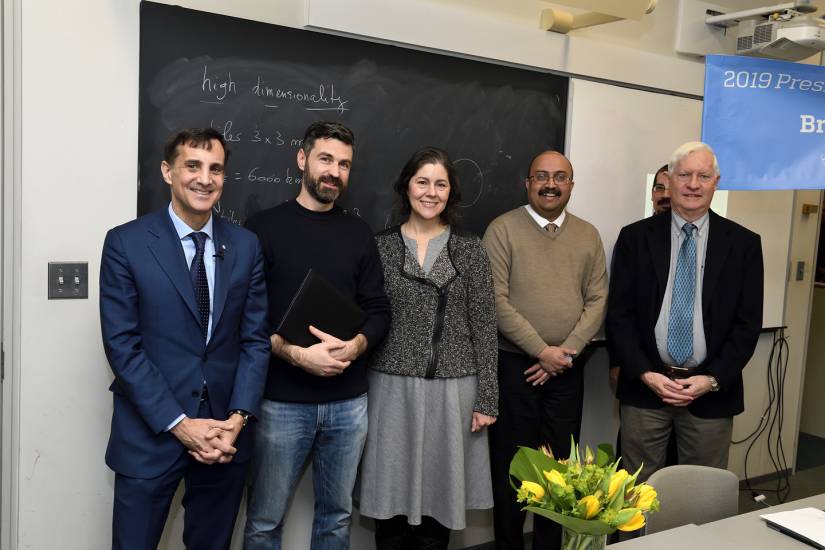
Image caption: From left: JHU President Ronald J. Daniels, Brice Ménard, Dean Beverly Wendland, Provost Sunil Kumar, and Timothy Heckman during the presentation of the 2019 Frontier Award
Image credit: Will Kirk / Homewood Photography
"What is fantastic with this award is the ability to explore new ideas without having to go through the lengthy and often unpredictable funding system of federal agencies," says Ménard, who received the Frontier Award this past winter. "I can just go right out there and explore new ideas."
Ménard, an associate professor in the Department of Physics and Astronomy, spent the summer working with OpenAI, one of the nation's leading artificial intelligence labs. With his Frontier funds, he says he plans to explore the mysteries of neural nets and, guided by the principles of statistical physics, investigate their inner structure to understand how they're able to perform complex tasks.
Ménard also plans to continue the Johns Hopkins Helium Balloon Project, an engineering experiment in which undergraduate students collect images of Earth from space. In November, he'll deliver the prestigious Hans Jensen Lecture at the University of Heidelberg in Germany.
Posted in University News




